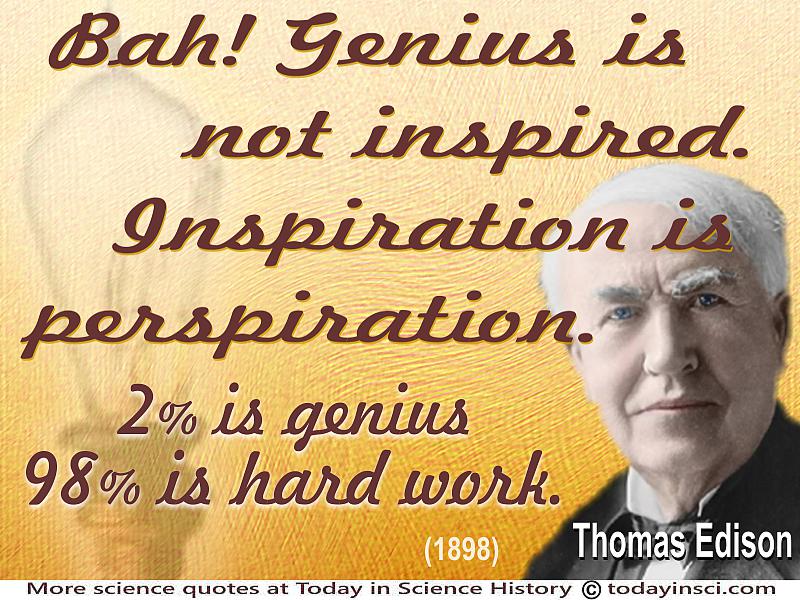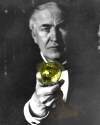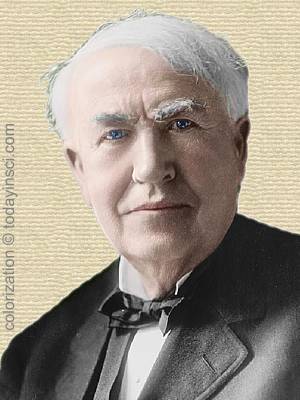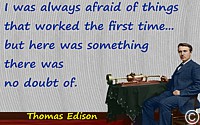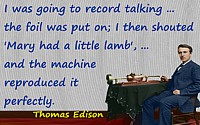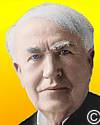 (source)
(source)
|
Thomas Edison
(11 Feb 1847 - 18 Oct 1931)
American inventor who was known internationally as “the Wizard of Menlo Park,” for the huge number of innovations coming from there, the world's first industrial research laboratory.
|
Thomas Edison - “Genius is not inspired. Inspiration is perspiration.”
Illustrated Quote - Large (800 x 600 px)
More Thomas Edison quotes on science >>
Context of Thomas Edison’s quote “Genius is not inspired. Inspiration is perspiration.”
The Ladies Home Journal in Apr 1898 profiled Thomas Edison with “A Group of Stories of the Great Inventor and ‘Wizard of Menlo Park,’ as Told by His Intimate Friends.” The article stated that the stories “so far as is known, are now printed for the first time.” It gave the two versions, shown above, of Edison's definition of genius. Another version also quoted as Edison's motto came in the Scientific American (27 Dec 1902):
“Genius is 2 percent inspiration and 98 percent perspiration.”
The magazine described this as “the incisive, epigrammatic answer [Edison] once gave to a man who thought that a genius only worked when the spirit moved him. Yet it must not be supposed that Edison is deficient in imagination. Every great inventor must have something of the poet in him; for without a most lively fancy, he could never see the possibilities of his own creation.”
In Simmonds’ 1934 biography1, the same 2 to 98 ratio was again given, quoting Edison's meeting with reporters in 1914, on his 77th birthday. Yet, in a 1910 biography gave the now most-quoted form2, namely:
“Genius is 1 per cent. inspiration and 99 per cent. perspiration.”
It is accompanied there with another another variant:
“Stuff! I tell you genius is hard work, stick-to-itiveness, and common sense,”
An expanded variation, also giving the 1 to 99 ratio, was presented by an Edison engineer, Samuel Insull, in a 1919 speech, who said he had asked Edison about the meaning of genius, and received this reply:
“Well, about 99 percent of it is a knowledge of the thing that will not work. The other 1 percent may be genius, but the only way I know to accomplish anything is everlastingly to to keep working with patient observation.”3
However, as with many familiar aphorisms, the idea may have evolved from an earlier expression. Kate Sanborn, in her Memories and Anecdotes (1915) wrote: “In my special class at home… One morning my theme was ‘Genius and Talent.’ I said Genius was something beyond—outside of—ourselves, which achieved great results with small exertion. … Talent must work hard and constantly for development. I said: ‘Genius is inspiration; Talent is perspiration.’ I had never heard that definition and thought it was mine. Of late it has been widely quoted, but with no acknowledgment, so I still think it is mine. Are there any other claimants—and prior to 1880?” Indeed, her earlier claim was recorded in the Detroit Journal, as cited in the Philadelphia newspaper The Times on 23 Dec 1892 (p.4).
2 Frank Lewis Dyer and Thomas Commerford Martin, Edison: His Life and Inventions (1910), Vol. 2, 607.
3 Collected in Samuel Insull: Selected Speeches (1914-1923), Public Utilities in Modern Life (1924), 192-193.
- Science Quotes by Thomas Edison.
- 11 Feb - short biography, births, deaths and events on date of Edison's birth.
- First Thomas Edison Lamp Factory - from Edisonia (1904)
- Thomas Edison Quote “Mary Had A Little Lamb” - Illustrated quote with Tinfoil Phonograph - Medium 500 x 350px
- Thomas Edison Quote “Mary Had A Little Lamb” - Illustrated quote with Tinfoil Phonograph - Large 800 x 600px
- The Talking Phonograph - Thomas Edison's invention of his tinfoil phonograph - article in Scientific American (22 Dec 1877) - with illustrated quote, medium 500px.
- Thomas Edison Quote “Something there was no doubt of” - Illustrated quote + tinfoil phonograph engraving 800px
- Thomas Edison - context of quote “Genius is not inspired. Inspiration is perspiration.” - Medium image (500 x 350 px)
- Thomas Edison Quote “Something there was no doubt of” - Illustrated quote + tinfoil phonograph engraving 500px
- Edison Fears Hidden Perils of the X-Rays - from New York World (3 Aug 1903).
- 1 Oct - short biography, births, deaths and events on date of opening of Edison's Menlo Park lamp factory.
- Edison: A Biography, by Matthew Josephson. - book suggestion.
- Booklist for Thomas Edison.
